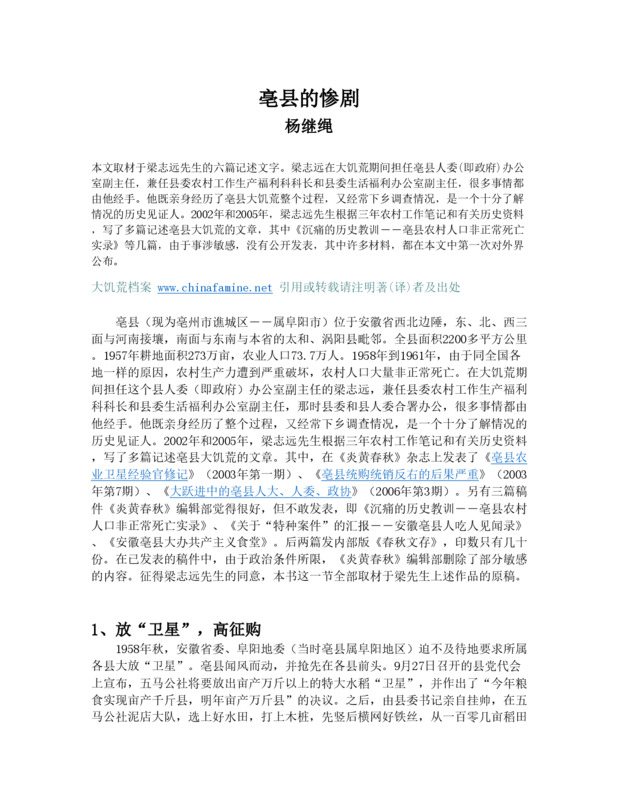Explore the collection
Showing 4 items in the collection
4 items
book
Return of the Soul from Purgatory: Memoirs of a Survivor of the "Sparks" Case from the Great Famine Era
In 1960, a group of faculty and students from Lanzhou University, who had been labeled Rightists and sent down to rural areas in Tianshui, Gansu, personally experienced the Great Famine. They self-published <i>Spark</i> magazine to expose and criticize the totalitarian rule that led to this catastrophe.<i>Spark</i> only published one issue before its participants were arrested and labeled as a counterrevolutionary group. Many were sentenced to long prison terms, and some were even executed. <a href=“http://108.160.154.72/s/china-unofficial/item/1759#lg=1&slide=0”>The first issue of <i>Spark</i> and more information about the "Spark Case" can be read here</a>.
<i>Return from Purgatory: A Survivor’s Memoir of the ‘Spark Case’ in the Great Famine Years (1957–1981)</i> is the autobiography of Xiang Chengjian, a key participant in <i>Spark</i> magazine. At the time, he and another student were responsible for printing the first issue, and he contributed six articles to <i>Spark</i>. Due to his involvement, he was sentenced to 18 years in prison for his role in the Spark case and was not rehabilitated until the early 1980s.
This memoir is divided into three sections, with a total of thirteen chapters spanning over 350,000 characters. It documents Xiang’s journey from being labeled a Rightist and sent to perform forced labor, to his arrest and 19-year imprisonment for his involvement in <i>Spark</i>, and finally to his struggle for rehabilitation and efforts to rebuild his life after release. In the book’s preface, scholar Ai Xiaoming offers the following assessment:
"Xiang Chengjian’s memoir holds significant value for the study of the intellectual history of contemporary China. First, it serves as another important testimony of the “Spark Case”, following Tan Chanxue’s memoir <i><a href=“”>Sparks: A Chronicle of the Rightist Counter-Revolutionary Group at Lanzhou University</a></i>, making it a crucial historical document on this act of resistance. The author reconstructs the social context before and after the case and describes how the young intellectuals behind <i>Spark</i> bravely challenged totalitarian rule. Second, the book provides a detailed account of labor camps in western China, with the author documenting his 18 years of forced labor in Gansu and Qinghai, unveiling a western chapter of China’s Gulag system. Third, it is a deeply personal intellectual history of a resister, showing the immense suffering, trials of life and death, and personal resilience under the crushing force of state violence."
The book’s appendix includes Xiang Chengjian’s six articles for <i>Spark</i>, an in-depth investigative report on him by journalist Jiang Xue, and a chronological record of the Spark Case compiled by Ai Xiaoming.
<i>Return from Purgatory</i> is published by Borden Press in New York and is the first book in the “People’s Archives Series”, published by the China Unofficial Archives. The author, Xiang Chengjian, has generously authorized the archive to share the book’s digital edition. Readers are encouraged to purchase the book to support the author and publisher.
Article
Special Feature|Famine and County (3): Hao County's Tragedy
This article is taken from six accounts by Mr. Liang Zhiyuan. Mr. Liang Zhiyuan was the deputy director of the Bo County People's Committee (i.e., the government) office during the Great Famine. He also served as the head of the Production and Welfare Section of the County Party Committee's Rural Work Department and the deputy director of the County Party Committee's Living and Welfare Office, where he was responsible for a lot of things. In 2002 and 2005, based on three years of rural work notes and relevant historical information, Mr. Liang Zhiyuan wrote a number of articles describing the Bo County famine, including "A Painful Lesson in History - The Unnatural Deaths of the Rural Population in Bo County." and several other articles. Due to the sensitivity of the matter, these have not been published publicly, and many of these materials are released to the outside world for the first time in this article.
Book
Tombstone: The Great Chinese Famine, 1958-1962
The Great Famine in China in the 1960s was a rare famine in human history. From 1958 to 1962, according to incomplete statistics, 36 million people died of starvation in China; due to starvation the birthrate is estimated to have dropped to around 40 million. The number of people who died of starvation and the lowered birthrate due to starvation totaled more than 70 million, which is not only the largest number of deaths among all the disasters that occurred in China's history, but also the most painful and unprecedented tragedy in the history of mankind today. Was this a natural disaster or a man-made disaster? Officials deliberately covered it up and tried to minimize it, forbid any public discussion or expression about it. Yang Jisheng, a senior reporter of Xinhua News Agency, personally experienced the death of his father in the famine. Since then, he has devoted his heart and soul to this story. He has spent several years on it, running through a dozen or so provinces where the disaster was the most serious, and personally checking countless archives and records, both public and secret. He has interviewed the people involved and checked the evidence over and over again. Thus, he felt confident that he could, with the heart of the historical pen and the conscience of the news reporter, make a number of drafts, and truly recapture this tragic history of the human race and analyze the causes of this tragedy with a large amount of facts and data. With a wealth of facts and figures, he identifies the main cause of the famine as the totalitarian system. This is a book carries the collective memory of many ordinary Chinese people, and is a tombstone for the 36 million victims.
This book is published by Tiandi Books in Hong Kong. The English version of <i>Tombstone: The Great Chinese Famine, 1958-1962 </i> was translated by American author Stacy Mosher and can be purchased <a href= "https://www.amazon.com/Tombstone-Great-Chinese-Famine-1958-1962/dp/0374533997">here</a>.



